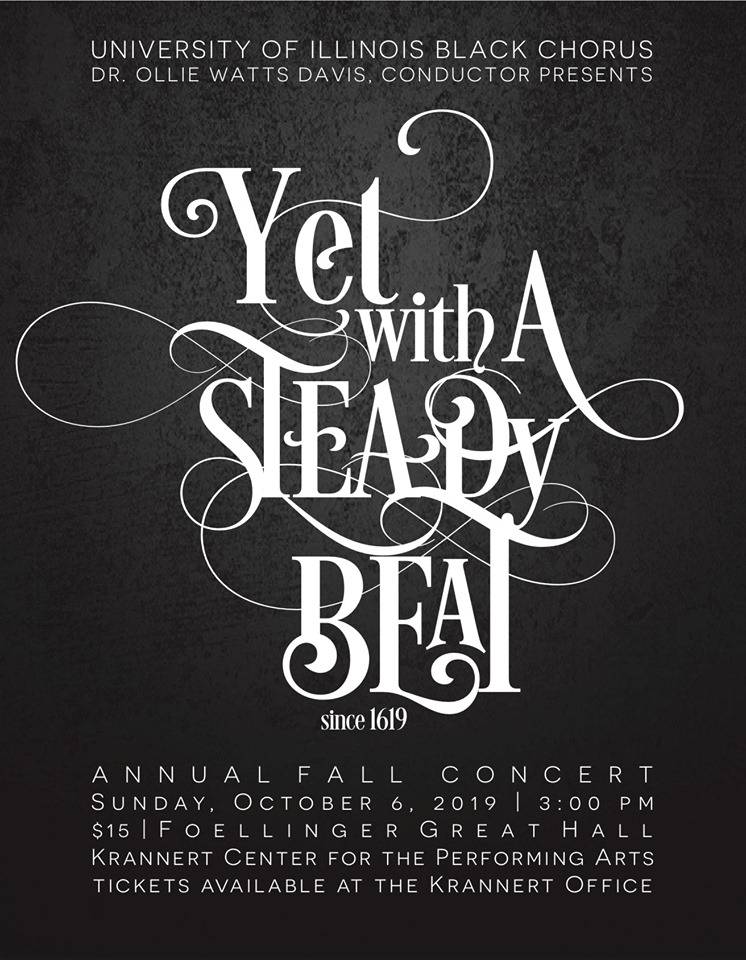“Lift ev’ry voice and sing, ’till earth and heaven ring,” wrote James Weldon Johnson, the opening lines of what would come to be called the Black National Anthem. First sung in 1900 by 500 school children in Jacksonville, Florida, to commemorate the birthday of Abraham Lincoln and a visit from Booker T. Washington, the song has gone on to be a source of inspiration for many Black Americans. Taking the title of their concert from a line in the second verse (“Yet with a steady beat, have not our weary feet, come to the place for which our father’s sighed?”), The University of Illinois Black Chorus, under the direction of Dr. Ollie Watts Davis, used the writings of J.W. Johnson on composing the song with his brother, singer and composer J. Rosamond Johnson, to structure their Fall concert this past Sunday, October 6th.

Before the concert even started, there was an audible hum one could hear from the lobby in the Krannert Performing Arts Center; the crowd buzzing with excitement for the concert to come and from the meetings and reunions taking place in the seats, creating a music of their own. After the show was delayed for ten minutes to allow for the line of people trying to get tickets to die down, the lights finally dimmed. From the wings, the choir, clad in black, walked into the aisles to surround us. The concert began with a musical offering of the traditional “Steal Away” by Dr. Watts Davis. Her voice is one that imparts a sense of serenity, of calmness; it immediately pulls you in and holds you there so that you don’t miss a second of her performance. Following a reading from J.W. Johnson’s account of writing “Lift Every Voice,” the choir sang Robert T. Gibson’s arrangement of “We Shall Overcome.” Sitting in the center of the auditorium surrounded, the choir behind and around me and soloists Joseph Moorehouse and Sheldon Adams Jr. in front of me, it was hard not to feel connected to the moment. “We shall overcome, we’ll walk hand in hand, we are not afraid.” In this political moment, with various forces pushing and pulling us apart, as we are finally forced to reckon with the direness of the situation of so many, this message is one for these times, and a brilliant way to set the tone for the concert to come.
The U of I Black Chorus’s next three numbers, “Somebody talkin’ ’bout Jesus,” “Mizpah (Lord, watch over me),” and “We Are Climbing Jacob’s Ladder,” demonstrated a level of skill and control that far surpassed anything I’ve heard from a collegiate level choir in many years. The choir hung to Dr. Watts Davis’s every movement and gesture and responded as one, creating dynamic contrasts within each piece that pulled you in close before threatening to blow you away. Unlike many choirs, they suffered nothing in blend from their commitment to dynamics. A special shout-out to the alto section is necessary. Throughout the concert, they sang as one and created a core around which the rest of the choir coalesced. The first half of the show ended with an arrangement of “Lift Every Voice and Sing” by Roland Carter. Beyond the beauty with which the choir sang the piece, what really touched me at that moment was seeing audience members around me, eyes closed, mouthing the words, some quietly singing along with the choir. To view and feel the connection that so many had to the song paled in comparison to any singing of “The Star-Spangled Banner” that I’ve been present for. I’ll let you draw your own conclusions about why that may be.
Though I arrived at Krannert to hear a concert, the second half of the concert ensured that I also made it to church on Sunday. From the masterful playing of the band to the amazing performances by the soloists, I stayed in a near-constant state of frisson. Solos by Olayemi Adebayo, Jasmine Denise Henderson, Antania Green, Quandra Clark, Charity Davis, Geraldine Dagher, Ashley Davis, and J’Ny Cockrell were simply stunning. As Dr. Watts Davis wrote in the program notes, the repertoire for the concert reflected themes of “joyful anticipation, meditative resolve, soul anguish, deep longing, unwavering courage, and unrelenting faith and hope,” and the choir successfully conveyed each and every one. Whether or not we wanted to go to church on Sunday, the choir offered their audience a chance at a spiritual experience. I highly recommend you attend their next concert if you’re able.
Graphic provided by the ensemble







